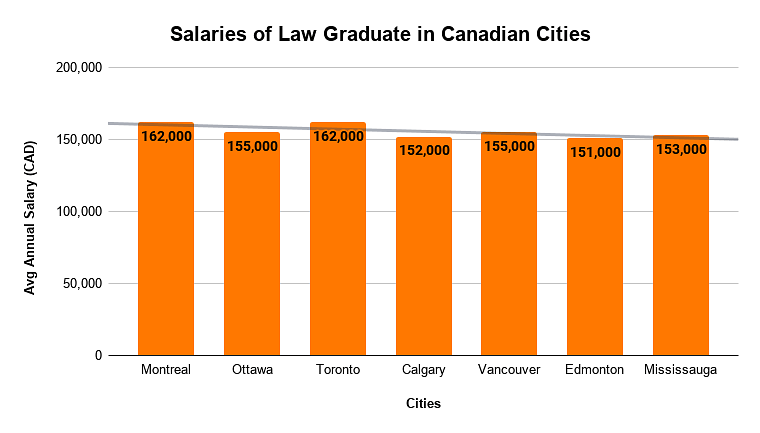When planning to pursue your career as a Lawyer or Quebec Notary in Canada, irrespective of where you have graduated from- Indian or Canadian Universities, you will be required to be a member of one of the law societies of Canada. Each Canadian province has at least one law society. Based on which province you want to find jobs as law graduates in Canada, you are required to be associated and governed by the respective provincial law society. There is an overall 14 provincial and territorial law societies in Canada.
Need Help? Get in touch with our Counsellors
The expected outlook for jobs for Indian law graduates or law graduates from Canada is considered fairly good for each province within the country. As per jobbank.gc.ca 2018 reports, it was recorded that overall of 106,600 lawyers was working in Canada. These positions were held by both national and international law graduates.
As per the predictions of labor supply and demand by Jobbank.gc.ca, 46,000 new jobs for law graduates are to arise in Canada within the time frame of 2019-2028. These jobs are expected to arise from both replacement and expansion demand, suggesting that you will not only get an opportunity to replace the retiring professional but new jobs will also find their way into the industry.
In the same report, it was also prompted that within the same time frame of 10 years the number of job seekers will reach around 46,600. The analysis of projected numbers released indicates that a balance is expected to continue in recent years for the labor supply and demand of the legal industry in Canada.
How to Become a Lawyer in Canada?
Before we dive further into the details of jobs for law graduates in Canada, let us have a brief overview of what is required to become a practicing lawyer in Canada. Whether you wish to study in Canada or your home country, the beginning to the process is similar, which is, getting an undergraduate pre-law major. Now if you plan on completing LLB from Canada, you will have to follow the route given below
- Apply for LSAT exam for getting your place with Canadian Law Schools
- Get your law degree from an accredited law school. You can choose to study Joint, One-year, or Dual programs offered at these law schools.
- Now, you will need to complete the province’s Bar Admission Course
- Following this, you will need to take-up CPLED (Canadian Center for Professional Legal Education) Bar Admission Courses and pass the bar admission examination.
- You are now eligible for membership with law societies.
In case you have completed your law education from a foreign educational institution, you will need to present your education to NCA (National Committee on Accreditation) and get is assessed. After the assessment, you will be required to sit for NCA exam. On fulfilling the NCA requirements you an request a Certificate of Qualification, which can be used to get into the Bar Admission Process.
Jobs for Law Graduates in Canada
Canada offers several job opportunities in various fields of law education. Most of your opportunities for working as a lawyer in Canada will be within three broader categories- Private practice, working with the government, or working public interest. A practicing lawyer as per jobbank.gc.ca earns between 37,000-294,000 depending on the firm, level of experience, province/city in which you work, and other such factors. Some of the highest paying provinces are Alberta, Ontario, Quebec, and British Columbia. Among these provinces, the highest paying cities are Toronto, Montreal, Vancouver, and Ottawa. Given below is a graphical representation of the highest paying cities for law graduates in Canada:

Note: The salaries given also include bonus values and are an annual average. The wages offered may vary depending on the firm and other factors.
As we can see, Toronto and Montreal are the highest paying cities for a lawyer, finding out the firms in Toronto and Montreal that will offer you a handsome package will help in shortlisting your options. Some prominent law firms in Toronto and Montreal along with their salaries are discussed below:
| Law Firms | Starting Salary (INR) |
|---|---|
| Baker and McKenzie | 71.13 lakhs |
| Blake, Cassels, and Graydon | 60.28 lakhs |
| McCarthy Tetrault | 68.72 lakhs |
| Fogler, Rubinoff LLP | 55.76 lakhs |
| Gardiner Roberts LLP | 48.22 lakhs |
| Goodman and Carr | 48.22 lakhs |
| Heenan Blaikie | 57.27 lakhs |
| Norton Rose Fulbright | 60.28 lakhs |
| Miller Thompson LLP | 57.27 lakhs |
| Thompson, Rogers* | 48.22 lakhs |
*Firms that provide bonuses on top of salary.
Top Careers for Law Graduates in Canada
With a law degree in Canada, students can work as an Advice Worker, Chartered Accountant, Civil Service Administrator, Data Analyst, Data Scientist, Forensic Computer Analyst, Human Resources Officer, Patent Attorney, Stockbroker or as a Trading Standards Officer.
The provision of legal services by lawyers in Canada is stratified into a number of market segments:
- Sole practitioners;
- Small and medium-sized firms;
- Large regional or national firms;
- Mega and multi-jurisdictional firms;
- In-house counsel as well as lawyers working in other corporate areas;
- Government and non-profit organizations.
Some of the jobs for law graduates in Canada are:
| Jobs for law graduates in Canada | Average Annual Salaries (INR) |
|---|---|
| Law Clerk | 31.83 lakhs |
| Legal Assistant | 37.31 lakhs |
| Research Assistant | 52.86 lakhs |
| Associate | 68.72 lakhs |
| Lawyer | 1.20 Cr. |
| Lawyer cum paralegal instructor | 55.34 lakhs |
| Associate Attorney | 90.42 lakhs |
| Intellectual Property Specialist | 72.34 lakhs |
| Solicitor | 70.49 lakhs |
Unsure about getting into practice? There are limitless job opportunities in Canada for students who do not want to practice law after the completion of their law education.
Other Jobs for Law Graduates in Canada
After completion of your law degree, if you decide not to continue as a practicing lawyer there are five major sectors you can explore:
- Education and Academic Administration: Apart from teaching in a college or a university, students can also opt for non-teaching positions in the universities. Law schools, in Canada welcome legally-trained individuals to work in admissions, alumni relations, career services, and law libraries.
- Banking and Finance: f the students have any experience in securities, trusts, estates, tax, or banking law, then they can use it in the banking and finance industry. Career options include that of a Risk Manager, estate planning advisor, trust officer, financial planner, commercial loans officer, and mutual fund administrator.
- Conflict Resolution: Fields such as arbitration, mediation, and negotiation are growing. Individuals with strong communication and dispute resolution skills get hired by labor unions, hospitals, school associations, universities, and government agencies.
- Government and Politics: In provincial and federal governments, lawyers often get hired as policy analysts. They gather and research information and analyze issues in written reports. They coordinate in developing strategic policy. Issues in the policy will be related to health, transportation, education, and the environment.
- Human Resources: Companies look for talented professionals to recruit new staff. Lawyers van also work as hiring coordinators, human resources administrators, or training managers. Other career options like law firm administrator, head of associate recruiting, marketing director, etc. are also open.
- Legal Consulting: If a student is tech-savvy, then he can use his knowledge about legal software to work as an IT consultant. The option of a legal nurse consultant is also available if a student has a nursing background.
- Legal Writing, Editing, and Publishing: Several lawyers use their research skills and work as freelance legal writers and editors. They not only contribute articles for legal publications but also write do-it-yourself law books. In Canada, you can also work as a columnist for newspapers and magazines or write content for law firm websites.
Salaries offered at such job roles are as follows:
| Job Role | Annual Average Salary (INR) |
|---|---|
| Law Professor | 89.82 lakhs |
| Paralegal Instructor | 54.67 lakhs |
| Legal Writer/Editor | 66.91 lakhs |
| Contracts Manager | 77.76 lakhs |
| Fraud Examiner | 80.78 lakhs |
| Investigator | 74.75 lakhs |
Apart from these, a law degree can also be useful for you if you want to make a career in non-traditional jobs. These jobs include that of an Administrator, Investigator, lobbyist, ethics officer, probation officer, consumer advocate, law librarian, auditor, etc. Skills valued the most in law, in Canada include handling volumes of work, understanding the importance of client service, understanding the value of getting clients back promptly, a disciplined work ethic, and paying attention to detail.
As far as the law jobs are concerned in Canada, the clients now expect more say in the services provided. As an increasing number of lawyers and non-lawyers are entering the marketplace, the trend may even become more pronounced. With the rise in need, the jobs for law graduates in Canada are becoming more and more pronounced. Recruitment firms such as Life After Law, Counsel Network, ZSA, RainMaker Group, Robert Half Legal, Marsden International, or NagataConnex Executive Legal Search specialize in placing lawyers in the Canadian marketplace. Skills valued the most in law, in Canada include handling volumes of work, understanding the importance of client service, understanding the value of getting clients back promptly, a disciplined work ethic, and paying attention to detail.
The country’s welcoming behavior for international lawyers also makes it easy for Indian law graduates to find a job in Canada. Additionally as lawyers are categorized as skilled workers obtaining a PR for Canada is also easier for an employed lawyer with an international law degree.
![University of Toronto [U of T]](https://static.zollege.in/public/college_data/images/studyabroad/logos/college_104_25-12:44_University_of_Toronto-logo-2417C8AF32-seeklogo.jpeg?tr=w-50,h-50,c-force?tr=h-40,w-35,c-force)
![The University of British Columbia [Ubc]](https://static.zollege.in/public/college_data/images/studyabroad/logos/college_64_25-11:13_Capture.jpeg?tr=w-50,h-50,c-force?tr=h-40,w-35,c-force)
![McGill University [Mcgill]](https://static.zollege.in/public/college_data/images/studyabroad/logos/college_39_24-17:26_macgill.jpeg?tr=w-50,h-50,c-force?tr=h-40,w-35,c-force)
![University of Montreal [U de M]](https://static.zollege.in/public/college_data/images/studyabroad/logos/college_71_24-17:54_udem.jpeg?tr=w-50,h-50,c-force?tr=h-40,w-35,c-force)
![Simon Fraser University [Sfu]](https://static.zollege.in/public/college_data/images/studyabroad/logos/college_54_25-11:01_Capture.jpeg?tr=w-50,h-50,c-force?tr=h-40,w-35,c-force)
![University of Alberta [UAlberta]](https://static.zollege.in/public/college_data/images/studyabroad/logos/college_9_24-17:46_alberta-.jpeg?tr=w-50,h-50,c-force?tr=h-40,w-35,c-force)










